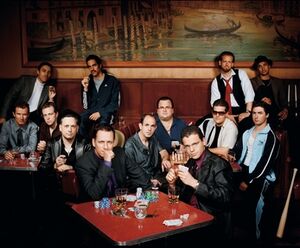PayPal Mafia facts for kids

The "PayPal Mafia" is a cool nickname for a group of people who used to work at PayPal. After leaving PayPal, many of them went on to create or help build some of the biggest and most famous technology companies in the world. Think of companies like Tesla, Inc., LinkedIn, SpaceX, YouTube, and Yelp. Many of these talented people studied at top universities like Stanford University or the University of Illinois.
The Story of the PayPal Mafia
PayPal started as a company called Confinity. It offered a service to send money online. In 1999, another company called X.com bought Confinity. Later, X.com changed its name to PayPal. In 2002, a big online marketplace called eBay bought PayPal.
After eBay took over, many of the original PayPal employees found it hard to fit in. eBay had a more traditional way of doing things. Because of this, most of the first 50 employees left PayPal within four years. But they stayed friends and business partners. They often worked together on new companies and investment firms.
This group of former PayPal workers became very successful. They started so many new and important companies. This led to the nickname "PayPal Mafia." The name became even more famous in 2007. An article in Fortune magazine used the phrase in its title. It also showed a fun photo of the former PayPal employees dressed like gangsters.
Key Members of the Group
The media often talks about certain people as members of the PayPal Mafia. Here are some of the most well-known:
- Peter Thiel: He was a founder and the first CEO of PayPal. Some people call him the "leader" of the PayPal Mafia.
- Max Levchin: He was another founder and the main technology expert at PayPal.
- Elon Musk: He founded X.com, which bought PayPal. Later, he became a key investor in Tesla. He also started SpaceX, Neuralink, and The Boring Company.
- David O. Sacks: He was a top manager at PayPal. After leaving, he started companies like Geni.com and Yammer.
- Roelof Botha: He was PayPal's chief financial officer. He later became a partner at a big investment firm called Sequoia Capital.
- Steve Chen: He was an engineer at PayPal. He later helped create YouTube.
- Reid Hoffman: He was a senior executive at PayPal. He then founded LinkedIn, a popular website for professional networking.
- Chad Hurley: He was a web designer at PayPal. He also helped create YouTube.
- Jawed Karim: Another PayPal engineer who helped create YouTube.
- Luke Nosek: He was a co-founder of PayPal. He later became a partner at Founders Fund with Peter Thiel.
- Keith Rabois: He was an executive at PayPal. He later worked at companies like LinkedIn and Square. He also invested in many successful startups.
- Premal Shah: He was a product manager at PayPal. He became the founding president of Kiva.org, a non-profit that helps people around the world.
- Russel Simmons: He was an engineer at PayPal. He later helped create Yelp Inc., a popular review website.
- Jeremy Stoppelman: He was a technology manager at PayPal. He also helped create Yelp.
Why They Are So Successful
People often say the PayPal Mafia helped bring back internet companies after a tough time in 2001. This was when many internet companies failed, known as the dot-com bust. The success of the PayPal Mafia is sometimes compared to how Intel was founded. Intel was started by engineers who had worked together at another company called Fairchild Semiconductor.
Journalist Sarah Lacy wrote a book about them called Once You're Lucky, Twice You're Good. She believes that the way PayPal chose its employees and the skills they learned there were important. But the biggest reason for their future success was the confidence they gained at PayPal.
Their success is also linked to a few other things:
- Youth: Many of them were young and full of new ideas.
- Silicon Valley: They were in Silicon Valley, a famous place for tech companies. It has the right environment and resources.
- Different Skills: The group had many different talents and skills.
- Strong Bonds: The founders of PayPal encouraged employees to become good friends. Many of them continued to trust and support each other even after leaving.
- Shared Challenges: They worked in a very competitive environment. They also faced many challenges to keep PayPal going. This shared experience created a strong and lasting friendship among them.
See also
 In Spanish: PayPal Mafia para niños
In Spanish: PayPal Mafia para niños
 | Delilah Pierce |
 | Gordon Parks |
 | Augusta Savage |
 | Charles Ethan Porter |

